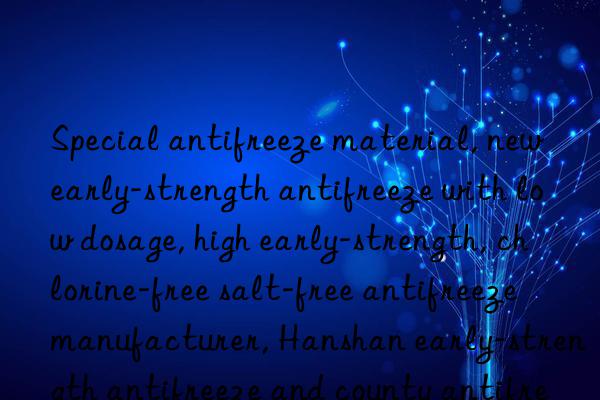
The damage to concrete structures caused by frost damage is second only to the damage to concrete structures caused by corrosion of steel bars, ranking second among the causes of concrete damage. Freeze damage has seriously affected the durability of concrete structures. sex.
There are two types of freezing damage to concrete. One is that the concrete that has been fully hardened undergoes freezing damage due to alternating positive and negative temperature changes, and the other is that the concrete is frozen in the early stage and suffers from freezing damage. Among them, the early freezing damage of concrete is mainly due to the freezing volume expansion of free water in the concrete that has not yet participated in the hydration reaction before the fresh concrete reaches the critical compressive strength. At this time, the cement has not yet been fully hydrated, and the gelation that plays a buffering and regulating role is The holes have not yet fully formed, causing frost heave damage to the concrete. In addition, the setting and hardening process of concrete is also interrupted by the freezing of the mixing water, which hinders the formation of the cement's microstructure, causing serious damage to the internal structure of the concrete and causing irrecoverable strength loss.
Anhui Yulong New Material Technology Co., Ltd. is dedicated to saving production costs and improving product performance for customers; it strives to solve problems in synthesis, compounding, production, application, etc. A series of questions.
Specially launches the latest research and development product-new early-strength antifreeze
New early-strength antifreeze
The new -type early -strong anti -freezant is the latest R & D product of the company. It uses special antifreeze materials, which can effectively reduce the freezing point of concrete and mortar, and greatly improve the antifreeze performance of concrete and mortar at negative temperature. The product is easy to use, reliable and has significant anti-freezing effect, and can be widely used in various concrete construction projects. Note: Due to the influence of floor materials and other reasons, the specific dosage is determined according to experimental conditions
Product Introduction
1. Performance Characteristics
Using special antifreeze materials, the antifreeze content is low, has high early strength, does not contain chlorine salts, and is easy to use. A substance that hardens at negative temperatures and achieves expected performance under specified curing conditions and prevents moisture in materials from freezing at low temperatures. Ensure the normal construction of concrete under negative temperature and reduce the freezing point in the concrete mixture. It can increase the early strength of concrete and mortar by more than 80% without reducing the later strength, thus ensuring the same strength development under positive and negative temperature conditions. The antifreeze effect is remarkable and can be combined with water reducing agent, air entraining agent, etc. to achieve better antifreeze effect.
2. Product indicators
Appearance: white or light yellow crystalline solid at room temperature
Density: (g/ml): 1.5~2
pH: 6~8%
3. Packaging and storage
Use 25kg, 50kg or ton bag sealed packaging, store in a cool, dry, well-ventilated place, avoid direct sunlight, pay attention to moisture and waterproofing.



 微信扫一扫打赏
微信扫一扫打赏
